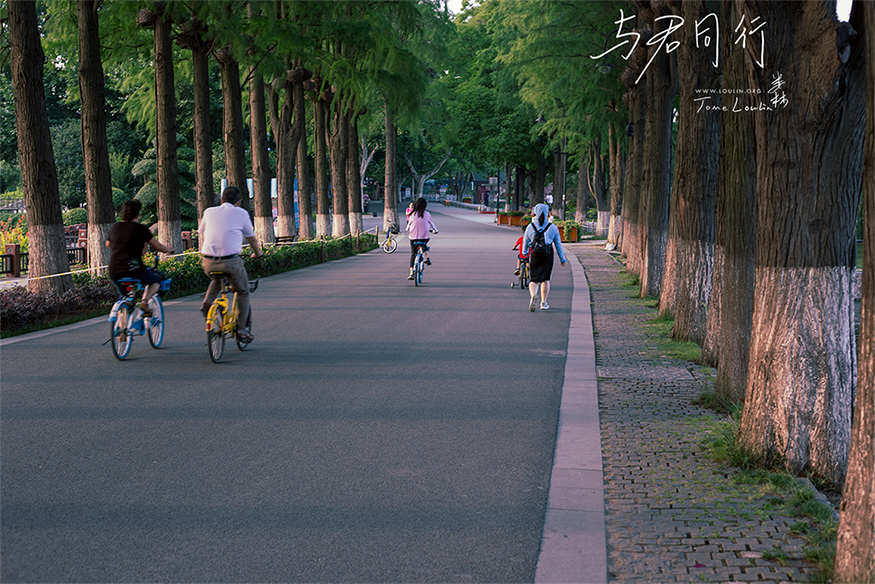by Tome Loulin
“Tome Loulin, you seem like coming back from beach after vacation.” A female colleague had teased me saying, referring my wearing: a training tank top and a very short short. Though a bit embarrassed but trying not to be seemed so, I smiled to her but said nothing. That was a summer and the sunlight very strong. Because of our good quarterly performances in sales, we got a group-vacation as a reward. Current-drifting was proposed as the recreational program and permitted.
While in the bus on the way to the valley where the drifting program is located, a male guide bragged that he was honored as the king of karaoke because of his good voice but everyone in the bus said nothing in response. He was not at all feeling embarrassed, instead, he was a bit excited and almost shouted to us, saying: “ you don’t believe me? How about letting me sing some songs I am good at to you?” “No, thanks, we’d love to sleep.” Some tourist in the bus had replied to him suddenly. But he had sung the songs he liked anyway.
After hearing his singing, a few had thanked him for his performance out of politeness then he had sat down and become quiet.
While a young woman was ready to speak and to raise her body, another older one had interrupted her saying: “ this girl is newly recruited by our company to work as a guide and she will read aloud some safety guides to you. Should there be any inconvenience occurred later, I would beg for your pardon.” Then in the bus was a silence and the young woman started reading: “If there were anyone in our tour group having encountered any emergency, please let us know.” The way the word emergency was read by her in Mandarin was like emergen-seex in English. It may be due to a sudden change of lines on her draft. Three women seating in front of me had burst into laughters. But unaffected, the young girl resumed reading. The bus was ascending on the highway. Outside of the window were mountains green-covered in a row.
After arriving at the valley, I said to my colleagues that due to my own concerns, I hope myself to remain on the land and to simply watch them drifting in the currents. But they had already bought my ticket days ago so they insisted me to join them together, otherwise, it would be a waste of money.
Before hearing that we would go to Yichang, the city where three gorges dam was located, to drift in the river currents, I had searched on the internet for information about that game. Only until I was utterly shocked by the information I got, which were overwhelmingly negative, depicting it as a risky game for inexperienced people to play and so on, had I stopped browsing.
Though that day is a brilliant and hot summer day but the water in the valley where we prepared to drift was as chilling as ice. With wave after wave hitting our body while we were on our course forward, I was much more concerned about the rocks in that small river so that every time when there was a descending, we bend our heads as low as to our thighs in order to protect our heads.
The whole course lasted about hours. And after I landed, finishing the journey, I felt extremely grateful that this had ended but some colleagues seemed unsatisfied and there was a female one said to us that she planned to go back drifting with her friends the next day.
The year I graduated from university was a year of endless traveling. Classmates had invited me to go to an amusement park in Wuhan which I rarely knew to play for the purpose of honoring our graduation.
While waiting in a line snaked about almost hundreds meters long to ride the roller coaster of which I was scared. But anyway, the ticket had been already bought so I had better not waste the money I spent, a classmate persuaded me saying.
Seeing people in front of me both excited and scared, I felt it was normal to be that way because I felt the same. But they my classmate said that it was better to have tried than never. If not now, when?
Media in China had previously criticized a phenomenon that most of the tourists in China had embossed their names on the walls of famous attractions, turning those in cultural ruins. That was almost a decade ago when selfies were not much prevalent and people’s urge to create proofs to show they had been to such places was strong. Now with the advancement of photography, those who want to have some thing to prove their existence no longer need to use such ways to show their travel histories. Souvenirs were no longer sophisticated things to them.
I had watched Palace Museum photographs on the postcards, alway under bright sunny days and seemed solemn. The yellow and dark red tone appeared on the postcards made a nostalgic air in my childhood memories.
Standing before a souvenir store in the palace museum, though the postcards depicting palaces Chinese imperial members lived in a stately air were still sold hanging on the stock stall, I was no longer interested in buying them, instead, I had watched those cards for a while and then gone.
Sending postcards to a close friend or a family member while traveling was once a regardful ritual, a means to show our considerate thoughts and regards to our friends. Now, with the advancement of the Internet, people are having less and less concrete memories relating to their family members and friends.
While during the pandemic, there was a news reporting that the sales of the card of condolence had surged, mainly in use to send people’s deep sympathies to the people they befriended. Receiving a physical thing is no same to a digital one.
Classmates in university had organized a camping. Before that, I had never climbed a mountain and though that experience is as ordinary and simple as it could be, with the passion and curiosity of youth, I had remembered that journey a faith-like one.
Where are we going? I had asked my grandmother while holding her hands walking in a dark night when I was little.
“Somewhere we call home.”

